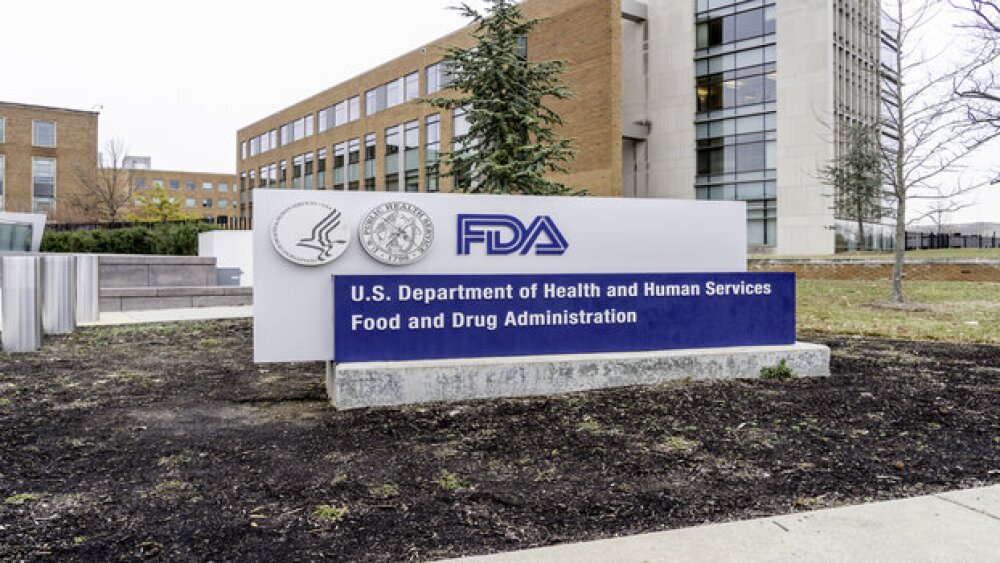This week, the FDA could approve the first CRISPR-edited therapy in the U.S., while two other companies await decisions on topical drugs.
Pictured: A sign in front of FDA headquarters/iStock, JHVEPhoto
The FDA has three target action dates on the books during the next two weeks, including one potentially industry-transforming decision for a CRISPR-based gene therapy.
Vertex, CRISPR Eye Landmark Gene Therapy Approval
In one of the year’s most highly anticipated decisions, the FDA is set to release its verdict on Vertex Pharmaceuticals and CRISPR Therapeutics’ investigational gene-edited therapy exagamglogene autotemcel (exa-cel) for the treatment of sickle cell disease (SCD).
If approved, exa-cel would become the first CRISPR-edited gene therapy in the U.S. It is intended to be a functional cure for SCD.
Designed to be a one-time, single-dose therapy, exa-cel takes a patient’s own stem cells and genetically edits them using a CRISPR/Cas9 system, enabling them to produce high levels of fetal hemoglobin, which is faulty in SCD. This mechanism of action allows exa-cel to target the hallmark symptom of anemia.
Vertex and CRISPR supported exa-cel’s Biologics License Application, which the FDA accepted in June 2023, with data from a pivotal Phase I/II/III trial and a long-term safety and efficacy study, which together demonstrated that the gene-edited candidate could significantly lessen severe vaso-occlusive events and hospitalizations.
The partners also provided evidence of exa-cel’s safety profile. In November, the FDA’s Cellular, Tissue, and Gene Therapies Advisory Committee agreed that Vertex and CRISPR had conducted a thorough analysis of exa-cel’s safety, particularly of its off-target effects.
On Nov. 16, the U.K.’s Medicines and Healthcare products Regulatory Agency approved exa-cel under the brand name Casgevy, making it the world’s first CRISPR-based gene-edited therapy.
Arcutis Seeks Approval for Roflumilast Foam in Inflammatory Skin Disease
The FDA is due Dec. 16 to render a verdict on Arcutis Biotherapeutics’ New Drug Application seeking approval for roflumilast foam 0.3% in seborrheic dermatitis.
Roflumilast foam is an investigational, once-daily, non-steroidal topical treatment being developed for a variety of dermatologic indications. It works by blocking the PDE4 enzyme, which is involved in the production of pro-inflammatory mediators. Arcutis is proposing to use this formulation in patients aged nine and above with seborrheic dermatitis, a common inflammatory skin disease.
If approved, roflumilast foam would be “the first topical drug with a new mechanism of action for this condition in over two decades,” Arcutis president and CEO Frank Watanabe said in a statement alongside the company’s announcement of the NDA acceptance.
The application is backed by data from a Phase II study, as well as STRATUM, a pivotal, double-blinded and vehicle-controlled Phase III trial. In STRATUM, roflumilast foam induced an Investigator Global Assessment success rate of 79.5%, as opposed to only 58% in vehicle comparators, an effect that was deemed statistically significant.
Arcutis’ topical treatment also met STRATUM’s secondary endpoints, leading to improvements in itch, scaling and redness. Roflumilast foam was also safe overall, resulting in very few study dropouts due to adverse events.
Roflumilast is approved as Zoryve cream for the treatment of plaque psoriasis in patients six years and older.
Optinose Awaits Verdict on Label Expansion for Xhance
Also on Dec. 16, the FDA is scheduled to release its decision on Optinose’s supplemental NDA, seeking to expand the use of its nasal spray Xhance (fluticasone propionate) to treat patients with chronic sinusitis without nasal polyps.
Xhance is a drug-device combination product that leverages Optinose’s proprietary Exhalation Delivery System to administer an anti-inflammatory agent deep into the nasal cavity, allowing the medication to reach difficult-to-access sinuses and drainage tracts. The product was first approved in September 2017 for the treatment of nasal polyps.
In its supplemental application, which the FDA accepted in May 2023, Optinose provided data from two randomized, double-blinded and placebo-controlled studies. The first, dubbed ReOpen1, enrolled patients with and without nasal polyps, while the second, ReOpen2, focused exclusively on those without polyps.
If approved, Xhance would be the “first-ever drug approved to treat chronic rhinosinusitis,” where there is a “high level” of patient dissatisfaction but “no FDA-approved drug treatments, other than for patients who also have nasal polyps,” Optinose CEO Ramy Mahmoud said in a statement.
Tristan Manalac is an independent science writer based in Metro Manila, Philippines. He can be reached at tristan@tristanmanalac.com or tristan.manalac@biospace.com.
For more great regulatory insights from BioSpace, sign up for our weekly ClinicaSpace newsletter:






